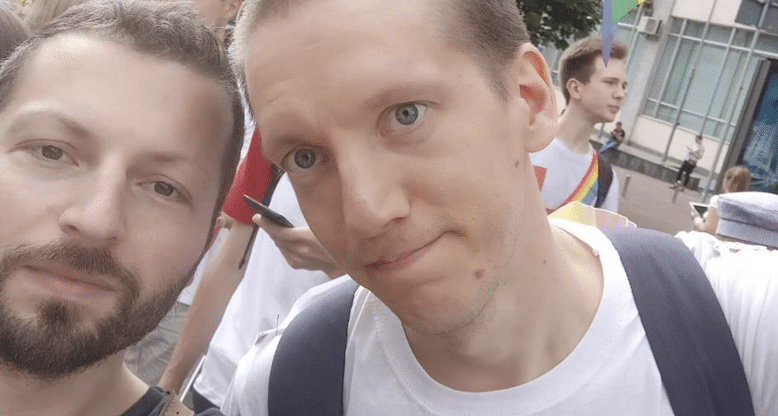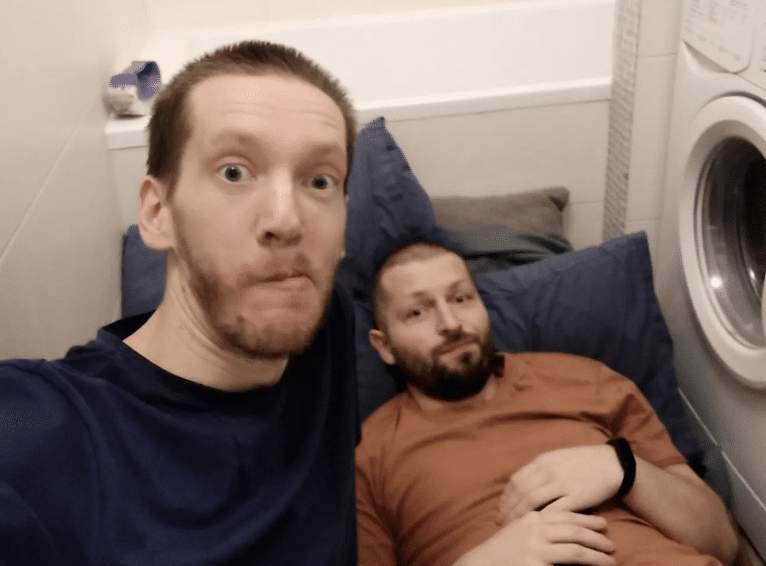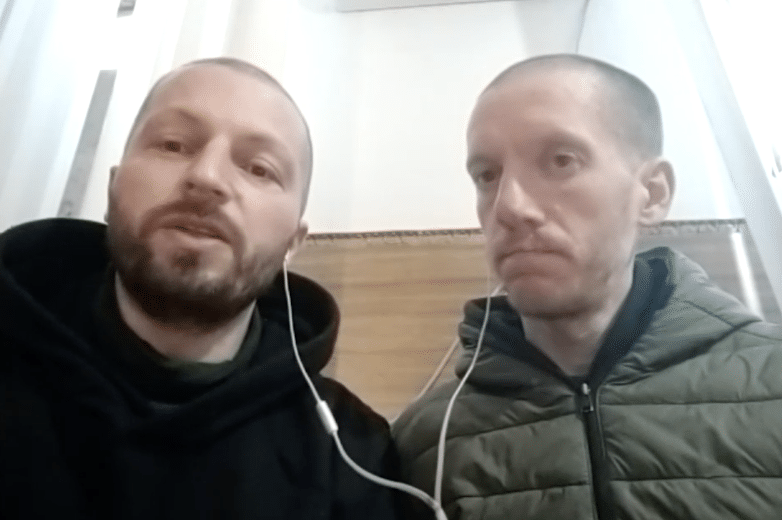Queer Ukrainian couple fighting side-by-side say they’re ready to die defending home from Putin

Oleksandr Zhugan (left) and Antonina Romanova (right) at a Kyiv Pride in 2019 (Instagram: Oleksandr Zhugan)
On 24 February 2022, LGBTQ+ couple Oleksandr Zhugan and Antonina Romanova watched from their apartment in Kyiv as news broke that Russia had invaded Ukraine’s eastern borders.
The next morning, after spending the night in their bathroom, they decided to join Ukraine’s Territorial Defence Forces. “We looked at each other and said: ‘OK, we are going to defend Ukraine,’ Zhugan recalls.
Neither Zhugan, a 37-year-old gay man, nor his partner Romanova, a 37-year-old trans non-binary person who uses she/her pronouns, had any previous military experience.
Although Ukraine’s military service is compulsory, both were exempt: “Antonina had health issues, and my parents are people with disabilities, when my parents divorced I had to be my mum’s caretaker,” says Zhugan.
The couple are speaking from the canteen in their barracks, dressed in Khaki uniforms and sharing a pair of headphones. The two often patrol opposite areas around Kyiv, so getting together for an interview is also an excuse to meet up.
Zhugan is more comfortable in English than Romanova and helps translate her answers.

Antonina Romanova (left) and Oleksandr Zhugan (right) hiding in their bathroom on the 24 February (Instagram / Antonina Romanova)
‘It didn’t feel like a romantic date but rather like meeting a soulmate’
The story of how the couple met begins seven years ago and is one of art and war. After the annexation of Crimea by Russia in 2014, Antonina Romanova was one of tens of thousands forced to leave her family and her home. She “was lucky enough to escape” she admits, “Russia’s Federal Defence Service is now looking for me, because they think that I’m a crazy nationalistic person.”
Shortly after Romanova and a few of her friends made it to Kyiv, she and Zhugan began speaking online. “We quickly discovered that we had similar interests in theatre and contemporary art and decided to bring it offline,” Zhugan explains.
“We met on a bridge linking Kyiv’s right and left banks, which is non-existent now. We drank coffee, talked all night long and wandered around the old city centre; It didn’t feel like a romantic date but rather like meeting a soulmate.”
In 2015, along with four other friends, the couple founded an independent theatre called PostPlayTheatre. One of the performances, called MAPS OF FEAR / MAPS OF IDENTITY, touched on the struggle of living with clashing identities such as being queer, a Christian, a Crimean refugee with a Russian passport, and a Ukrainian patriot.
Many of these artistic projects were born in the aftermath of 2014’s Revolution of Dignity, a series of deadly clashes between protesters and security forces that saw then-president Viktor Yanukovych ousted and his government overthrown. For Zhugan, Romanova and their friends, “our Ukrainian identity was crystallised during those events.”
“We didn’t fight, we didn’t take up guns, but we had our own battlefield through our art,” Zhugan explains. Looking back, the couple recognises that their theatre space was a safe place for their art and relationship to blossom.
View this post on Instagram
Ukraine queer couple felt they had ‘no other choice’ but to risk their lives
When asked what life was like being queer in Ukraine before the war, the couple’s faces darken. “The level of homophobia is still very high in Ukraine,” says Zhugan. “It is getting better every year, but still, it is very dangerous.”
And sadly, Zhugan and Romanova recently found out just how dangerous it can be. In the autumn of 2021, a few months after Romanova came out as non-binary, the couple were out walking in central Kyiv.
Romanova was wearing “a very, very small rainbow ribbon” but this was enough for the two to be targeted in broad daylight. Before they knew what was happening, two men attacked them and they were beaten and pepper sprayed. Later they found out the two homophobes “were on safari”. “They were hunting homosexuals and we were just in the way,” says Romanova.
Despite police increasing their presence at LGBTQ+ events in response to several clashes at Kyiv’s pride marches, these ‘safari’ groups are still commonplace.
The couple’s decision to join the Territorial Defence Forces will be surprising for some who wonder why they would risk their lives for a country where their own human rights are still far from being upheld. Gay marriage and adoption is still illegal and Ukrainian law doesn’t recognise homophobia or transphobia as discriminatory motives for hate crimes, which stops people like Zhugan and Romanova’s assailants from feeling the full force of the law.
Ukraine’s first Kyiv Pride in 2013 was originally attended by just 50 people. Six years later in 2019 the pride march was 10,000 people strong. However, a statement by director of NGO KyivPride, Lenny Emson, links the rise in visibility to a rise in anti-LGBTQ+ attacks, saying: “Our increased visibility has sparked a surge in the number of hate crimes against LGBTI people. These groups are operating in an organised manner. They are easy to identify. But they are enjoying near total impunity for their attacks.”
When asked why they felt the need to join the Territorial Defence Forces, Zhugan says they felt like they didn’t have “any other choice”.
“It was really a very comical situation because we are as far from the military as we can possibly be,” Zhugan says. Having had run-ins with authorities before, speaking to people in uniforms makes him “feel anxious” – and both he and Romanova admit that if they weren’t in this together, they would most likely never have joined.

Oleksandr Zhugan (left) and Antonina Romanova (right) during an interview with Kaine Pieri
(Kaine Pieri)
‘Ukraine as a nation needs to have its own coming out’
So why join at all? If not from a sense of patriotism, Zhugan and Romanova say they joined in a bid to cope with the anxiety and fear of being at war and not knowing what to do. It’s a feeling that many Ukrainians have, they say: “I’ve talked to lots of people, to lots of volunteers, and they all say one thing: ‘While we are alive, we are not doing enough.’”
When I ask him why he mentioned being alive, Zhugan tells me: “Because doing enough is to die for your country, I suppose. And while you are alive, you are not good enough.”
After Russia invaded, the couple were shocked to find that their creativity had left them. “Times of crises normally stimulate artists to create, to write, to make music, and I was like, ‘Oh my God, I am out of creativity completely,’” Zhugan remembers. “It feels like art has left our lives and we’re not sure if we can go on in the art sphere after the war.”
As the interview continues, the quiet room is suddenly filled with the sound of men’s voices. Romanova and Zhugan glance at each other and let me know they are no longer alone in the canteen. When asked about their experience of being a queer couple in the military, they explain they live under the ‘don’t ask, don’t tell’ rule, which expects a soldier to keep their silence when it comes to their sexuality and gender.
“We haven’t been bullied or anything, but Antonina was told she couldn’t use she/her pronouns by her commander,” Zhugan says. This “made her sad” but hasn’t stopped her from using them outside of the officer’s presence.
The two share a room with other soldiers so they don’t have “any privacy”, but have made some friends. One of them saw a post on Zhugan’s social media that compared Ukraine’s struggles
with the LGBTQ+ community’s.
“I posted about how Ukrainians as a nation need to have their own coming out.” The fellow soldier then came up to the couple and told them that although he didn’t put a ‘like’ on Zhugan’s post, he wanted to tell them “in person that it was a good text” and that he supported them. However, this is pretty much it when it comes to the couple’s positive experiences since joining the Territorial Defence Forces, they say.
View this post on Instagram
It’s been two months since the war began and the couple say they are “emotionally exhausted”. For the first few weeks they were pumped with adrenaline they explain: “The first days of war everything was black and white; you know who the enemy is and you know who’s on our side.
“But now it’s beginning to look more like different shades of grey, when you are in one unit with people who you would never, ever work with or be friends with, but you have to be on one side.”
The last few weeks though, they have the feeling that things are beginning to “plateau”: “We’re just doing what we are told and trying not to reflect on anything, really, because when you come to think of it, it’s just horror.”
When asked how they get through the hardest days, it is clear that they lean very heavily on each other for support through small things like constantly asking each other how they are doing. Romanova longs to play her Ukulele and Zhugan has found that Harry Potter audio books help him sleep.
“I’m not a very great fan of Harry Potter,” he laughs, “but nothing else would do the trick. I tried different books for self-improvement or historical books, but no, you know, books for kids. Yeah, that’s for me.”
Despite their unsure future, both are hopeful that LGBTQ+ rights and visibility will continue to make progress. “When we win the war, I think it is going to be a huge step forward for the LGBTQ community in Ukraine,” Zhugan says, “it’s going to be very similar to what happened in Ukraine in 2014 after Maidan and the Revolution of Dignity, when lots of LGBTQ+ people became visible.”
And the couple’s message to Ukraine, like many of the queer soldiers or volunteers who are currently risking their lives for their country is simple: “We are here. We didn’t leave our country. We didn’t flee to the west of Ukraine or abroad, we are here to protect our country.”
When the war ends though, Romanova and Zhugan say the first thing they’ll do is visit their relatives in the east who are waiting for them with a small house and a garden that the couple say they can’t wait to look after.

